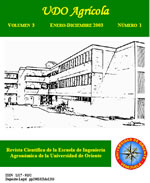
|
Revista Científica UDO Agrícola
Universidad de Oriente Press
ISSN: 1317-9152
Vol. 12, No. 3, 2012, pp. 535-541
|
 Bioline Code: cg12061
Bioline Code: cg12061
Full paper language: English
Document type: Research Article
Document available free of charge
|
|
|
Revista Científica UDO Agrícola, Vol. 12, No. 3, 2012, pp. 535-541
| en |
Growth, development and quality of fruit of 'Tahiti' lime ( Citrus latifolia  Tanaka) in the Monagas State, Venezuela Tanaka) in the Monagas State, Venezuela
CHACÍN, Adolfo Enrique CAÑIZARES; BONAFINE, Osmileth; NATERA, Jesús Rafael MÉNDEZ; LAVERDE, Dierman & PUESME, Raimundo
Abstract
The cultivation of 'Tahiti' lime ( Citrus latifolia

Tanaka) has acquired importance in Venezuela and in Monagas state, for ots
profitability. For this reason, the study was carried out with the objective of evaluating the growth, development the
physical-chemical characteristics of the fruit to determine the harvest time under savanna conditions of the Monagas state.
The experiment was established in a commercial plantation of lime, located at Tarragona, Cedeño municipality, Monagas
State. One hundred and twenty plants were selected and the flowering beginning date was registered, subsequently branches
were marked where anthesis occurred the same day. Seven days intervals after anthesis, fresh and dry weight, polar and
equatorial diameter of fruits, juice volume, titratable acidity, soluble solids, pH and days from anthesis to harvest were
determined. In 'Tahití' lime crop, fruit development followed a sigmoidal model from anthesis to maturity, characterized by
three periods: phase I from the style fall to the increment of fruit fresh and dry mass and diameter, phase II was
characterized by fast growth, phase III, when the increment in the fruit size decreased. The soluble solid content decreased
from the second phase, while pH and titratable acidity increased from this phase.
Keywords
Optimal harvest date, quality, physiological changes, 'Tahiti' lime
|
| |
| es |
Crecimiento, desarrollo y calidad del fruto de Lima 'Tahití' ( Citrus latifolia  Tanaka) en el Estado Monagas, Venezuela Tanaka) en el Estado Monagas, Venezuela
CHACÍN, Adolfo Enrique CAÑIZARES; BONAFINE, Osmileth; NATERA, Jesús Rafael MÉNDEZ; LAVERDE, Dierman & PUESME, Raimundo
Resumen
El cultivo de la lima 'Tahití' ( Citrus latifolia

Tanaka) ha adquirido importancia en Venezuela y especialmente en el estado
Monagas, por su rentabilidad. En razón de ello, se realizo el presente estudio con el objetivo de evaluar el desarrollo y las
características físicas-químicas del fruto para establecer la época de cosecha en las condiciones de sabana del estado
Monagas. El experimento se estableció en una plantación comercial de lima, ubicada en Tarragona, municipio Cedeño del
estado Monagas. Se seleccionaron 120 plantas, en las cuales se reportó la fecha de inicio de la floración, posteriormente se
marcaron las ramas donde la apertura floral ocurrió el mismo día. A intervalos de siete días, después de la apertura floral, se
determinó: masa fresca y seca, diámetro polar y ecuatorial de los frutos, volumen de jugo, acidez titulable, sólidos solubles
totales, pH y los días transcurridos desde la apertura floral hasta la cosecha. En el cultivo de la lima 'Tahití', el desarrollo
del fruto siguió el modelo sigmoideo desde antesis hasta maduración, caracterizada por tres periodos: fase I desde la caída
del estilo hasta el incremento de la masa fresca y seca y del diámetro de los frutos, fase II se caracteriza por crecimiento
rápido, fase III, cuando disminuyó el incremento en el tamaño del fruto. El contenido de sólidos solubles totales disminuyó
a partir de la segunda fase, mientras que el pH y la acidez titulable aumentaron a partir de esta fase.
Palabras-clave
Época óptima de cosecha, calidad, cambios fisiológicos, lima 'Tahití'
|
| |
© Revista Científica UDO Agrícola
Alternative site location: http://www.udoagricola.orgfree.com
|
|
